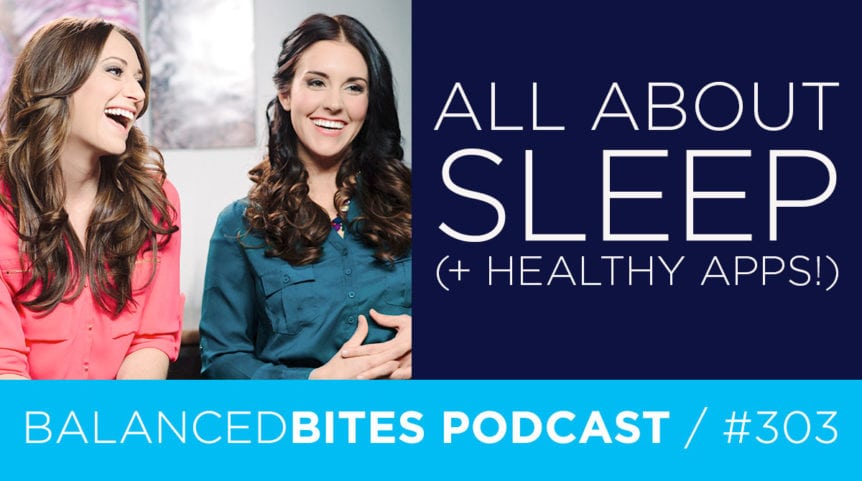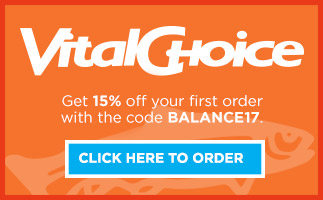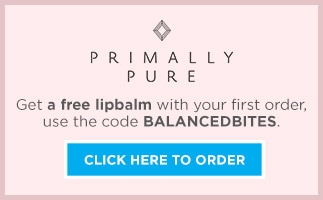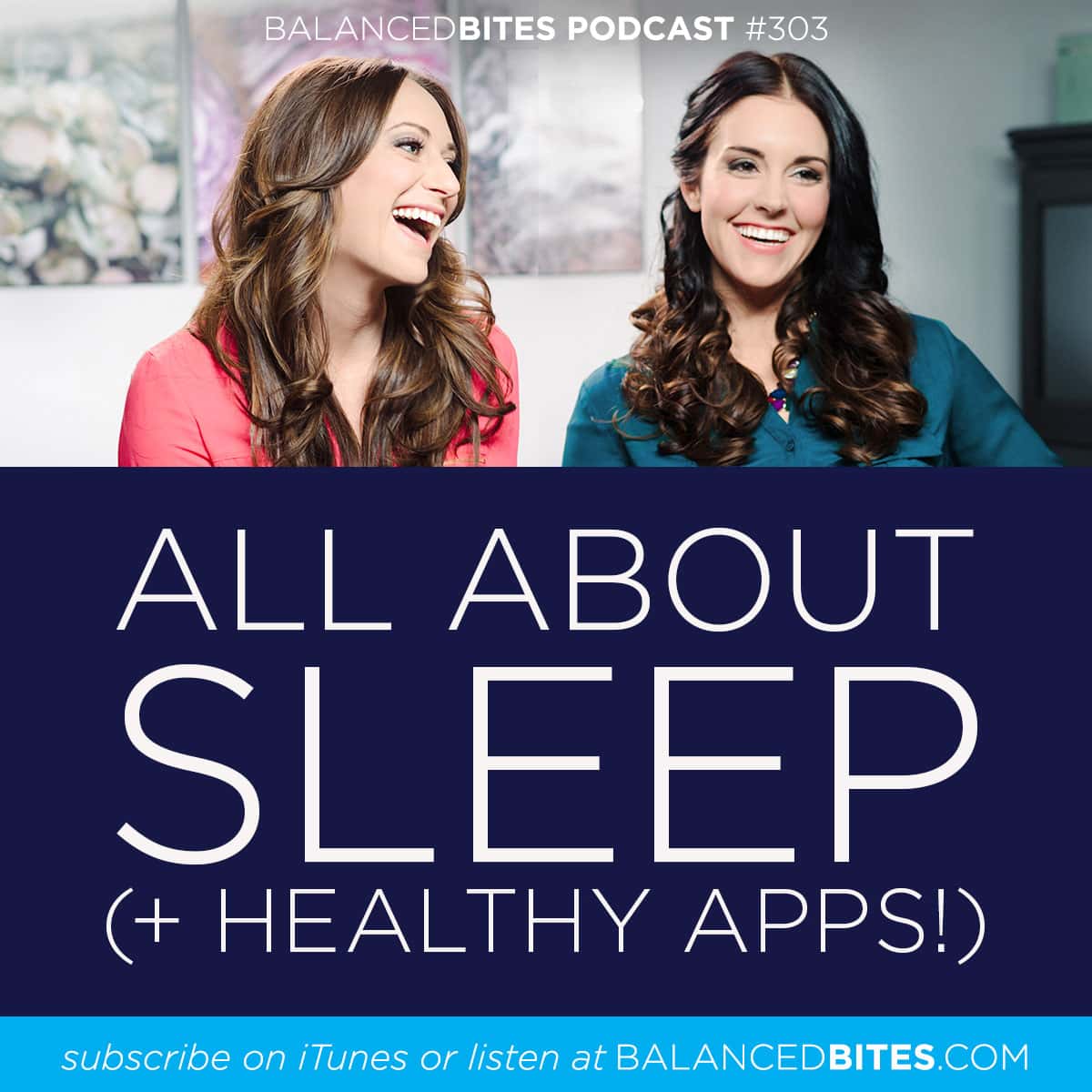 Topics
Topics
- News and updates from Diane & Liz [2:11]
- Shout out: Lori Newlon, The Bariatric Dish [7:11]
- Sleep and circadian rhythm [9:27]
- Blue lights and blue-light blockers [16:05]
- You can't hack nature [22:17]
- Apps for optimizing sleep [25:12]
- #Paleointhenews: The coconut oil debacle [31:42]
Subscribe to DianeSanfilippo.com
Why Coconut Oil Won't Kill You But Listening to the American Heart Association Might
Is Coconut Oil Really Bad for My Heart!? (Re: That USA Today Coconut Oil Article)
The episodes are also available in iTunes, Spotify & Stitcher.
![]()
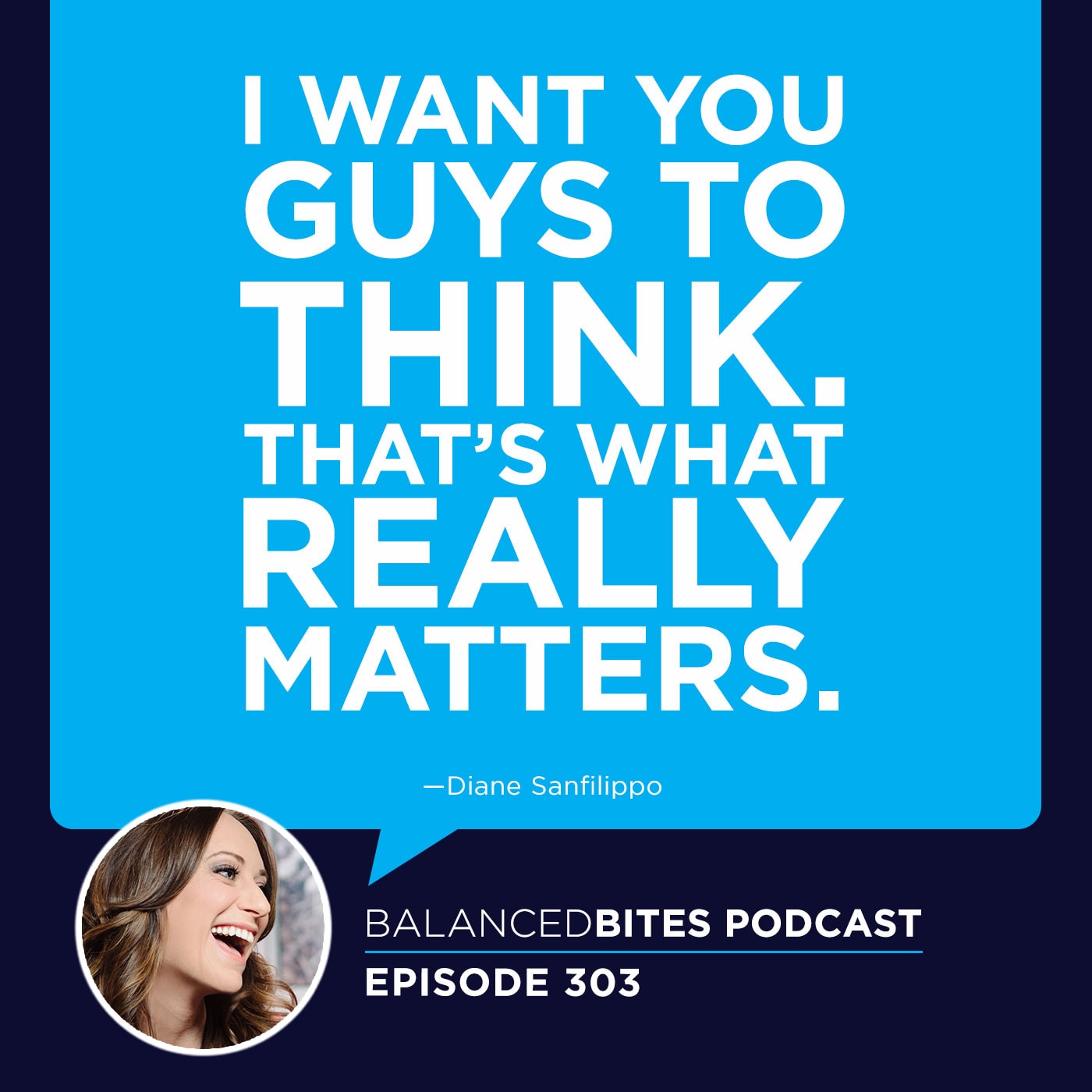
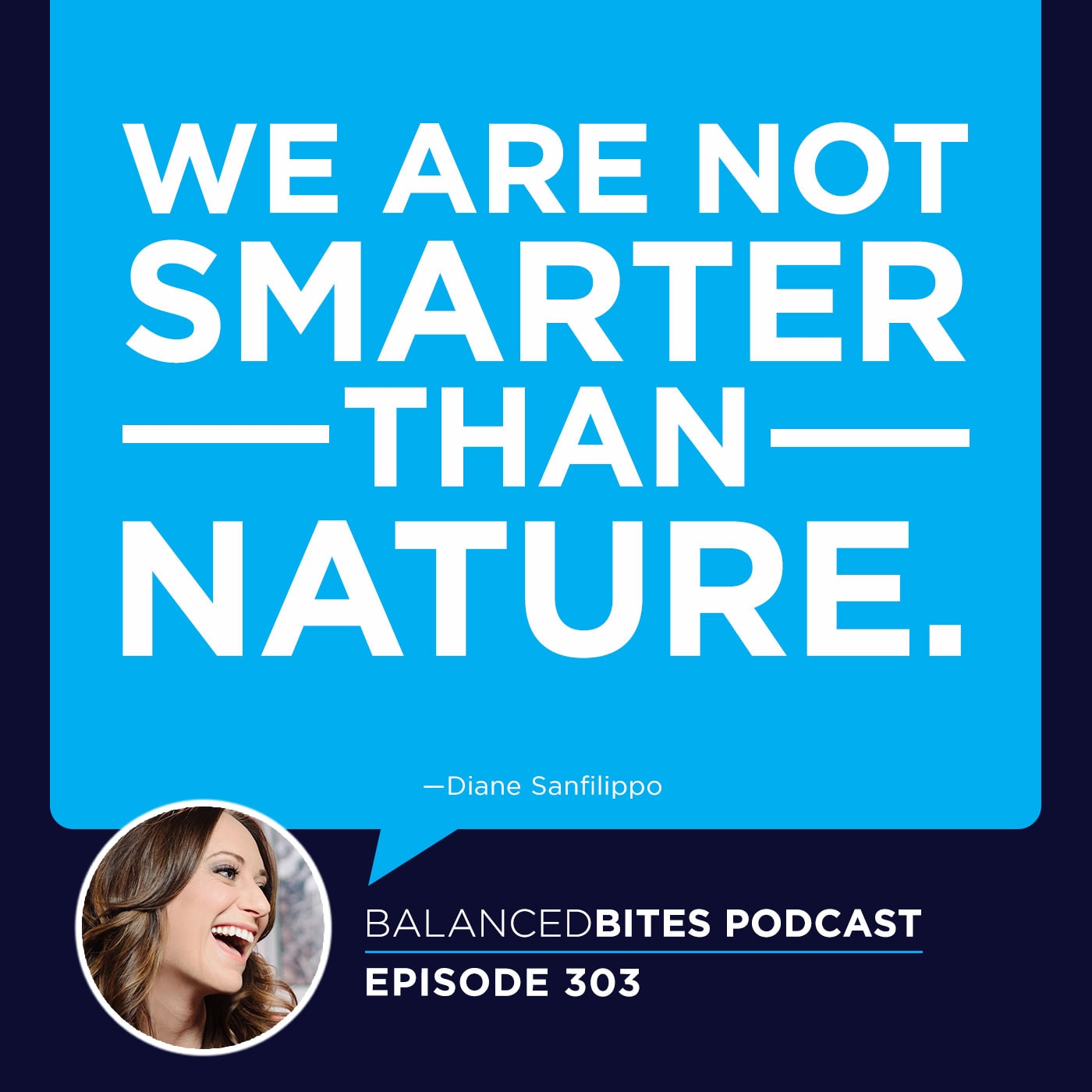
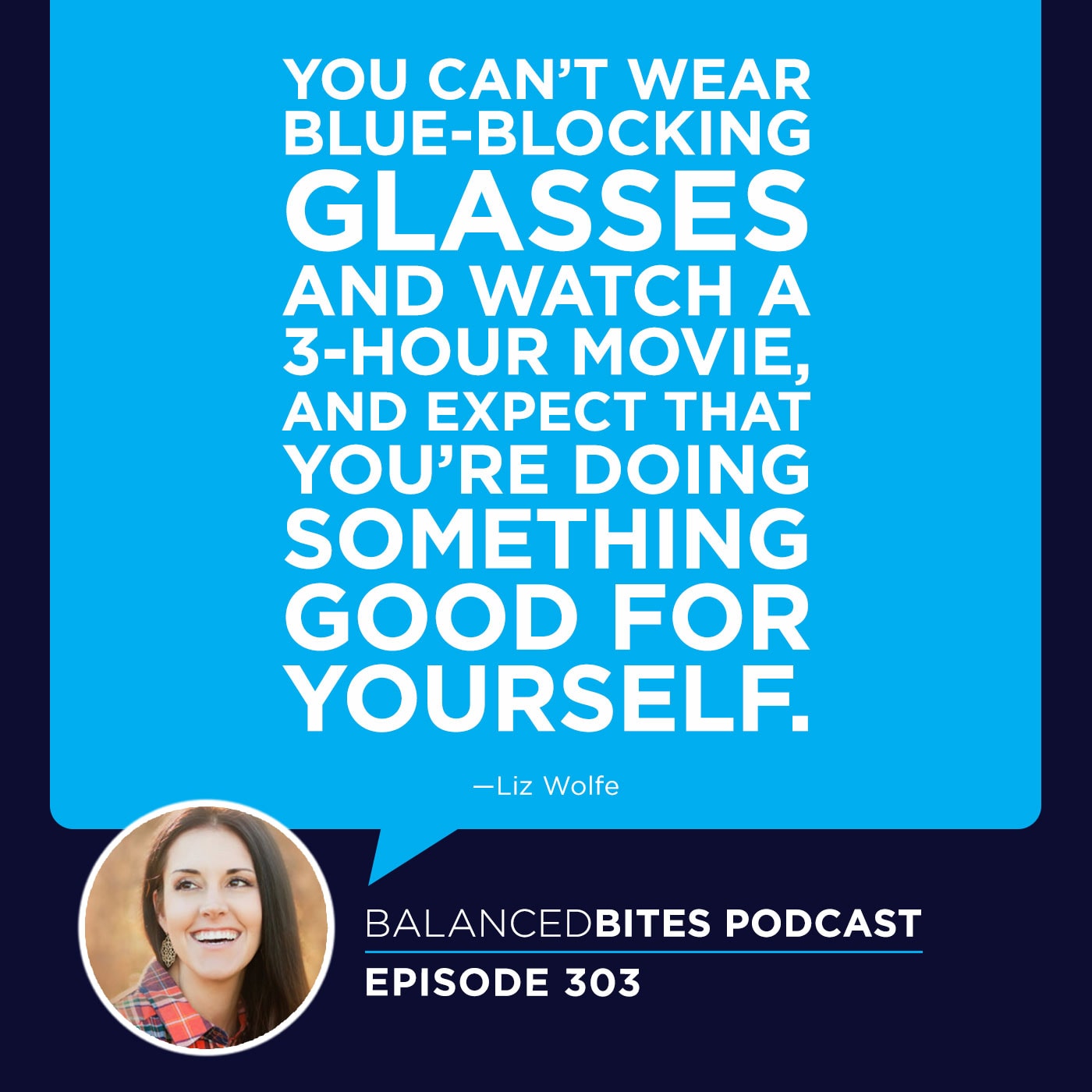
You’re listening to the Balanced Bites podcast episode 303.
Diane Sanfilippo: Welcome to the Balanced Bites podcast. I’m Diane; a certified nutrition consultant, and the New York Times bestselling author of Practical Paleo and The 21-Day Sugar Detox. I live in San Francisco with my husband and fur kids.
Liz Wolfe: I’m Liz; a nutritional therapy practitioner, and author of the Wall Street Journal best-seller Eat the Yolks; The Purely Primal Skincare Guide; and the online program Baby Making and Beyond. I live on a farm in the mystical land of the Midwest, outside of Kansas City.
We’re the co-creators of the Balanced Bites Master Class, and we’ve been bringing you this award winning podcast for nearly 6 years! We’re here to share our take on modern paleo living, answer your questions, and chat with leading health and wellness experts. Enjoy this week’s episode, and submit your questions at http://blog.balancedbites.com, or watch the Balanced Bites podcast Instagram account for our weekly calls for questions. You can ask us anything in the comments.
Remember our disclaimer: The materials and content within this podcast are intended as general information only, and are not to be considered a substitute for professional medical advice, diagnosis, or treatment. Before we get started, let’s hear from one of our sponsors.
Liz Wolfe: The Balanced Bites podcast is sponsored in part by the Nutritional Therapy Association. The NTA trains and certifies nutritional therapy practitioners and consultants (including me; I’m an NTP), emphasizing bio-individuality and the range of dietary strategies that support wellness. The NTA emphasizes local, whole, properly prepared nutrient dense foods as the key to restoring balance and enhancing the body’s ability to heal. Nutritional therapy practitioners and consultants learn a wide range of tools and techniques to assess and correct nutritional imbalances. To learn lots more about the nutritional therapy program, go to http://www.NutritionalTherapy.com. There are workshop venues in the US, Canada, and Australia, so chances are you’ll be able to find a venue that works for you.
1. News and updates from Diane & Liz [2:11]
Liz Wolfe: Alright. So, Diane. Hello friend.
Diane Sanfilippo: Oh, hello.
Liz Wolfe: What’s up with you this week?
Diane Sanfilippo: Well, we've moved. {laughs}
Liz Wolfe: Wow!
Diane Sanfilippo: This is; its big. I think this is the first episode we’re reporting with me in the new digs.
Liz Wolfe: Yeah. With your beautiful kitchen behind you.
Diane Sanfilippo: Oh, well. I’m in the dining room today. But, that's because we haven't finished painting the furniture to go in the little studio office room that I’ll be recording from in the future. So, yeah. I'm excited. It’s just been so nice to get settled in a new place, have a little bit more space, and also for it to really be our own. I know you guys have been at a little homestead there, and you know, when you can say that the whole place is yours, it's just really nice. And living in an apartment was great. We had a wonderful view. We traded the view for a chance to kind of own our own place. So, yeah, we're just really excited. And it feels like home. And we feel very grounded. And love tinkering. The house was built in like the early 1920s, so lots of tinkering, and windows that don't work right, so. We’re fixing it all up, and getting things going.
Liz Wolfe: So fun.
Diane Sanfilippo: Yeah. Luckily, they did do the kitchen before we got here. But yeah, that’s kind of what’s new personally. And also, for those who haven't heard the big news. I am working on some last stuff. The next few months over the summer, details for the 21-Day Sugar Detox Daily Guide. It’s my new book that's coming out next year, next January. I think January 2 is the actual release date. And I’ve got some fun goodies for folks, so if you preorder that on Amazon, you'll be able to get in on the freebies for preorder. We don't have it set up yet, since it is a good six-plus months out. But that's coming. So you can go to www.BalancedBites.com/dailyguide to get details on that. And I think that's pretty much it for now. What’s up with you?
Liz Wolfe: I’m still a little hot under the collar about what we talked about before we came on the air. I literally have nothing else in my head right now. It’s just whooshing back and forth in my brain. Friends; I got a little caught up Instagram comment drama recently. And I shouldn’t have done that. And lesson learned. The end. That's what I have for folks. The internet is a vast world full of people bringing things down.
Diane Sanfilippo: You know everyone is now rushing to your Instagram page to be like, “Where’s the drama?! Let me find it!”
Liz Wolfe: Oh, it’s gone. It's gone. Here's the thing. I don't; ugh. I know a lot of people leave up all manner of comments, but I’m a little delete happy. Because I feel, you know. I’m not the most positive person in the world. I do not take enough time to cultivate joy in my life. And sometimes that translates to getting irrationally caught up in other people's negativity on Instagram {laughs}. I’m being so obscure. But we just, none of us. None of us need to engage in online obscure negativity or arguments. So with that awareness, sometimes I have to pull the reins back on myself, and I have to delete myself. I have to just choose to…
Diane Sanfilippo: That sounds like some kind of Sci-Fi movie. “I have to delete myself.”
Liz Wolfe: Oh my gosh, I have to delete myself. That would totally work as a plot. Like, what does it mean to delete yourself.
Diane Sanfilippo: I think they tried to do that on Portlandia. Like, they deleted someone from all social media and all the things, and then their friend thought that they were dead. I forget what it was. I think it was Fred, missing from everything, and no one knew where he was because he wasn’t on any social media. I don’t remember exactly.
Liz Wolfe: Oh my gosh, I’m going to have to Google that. The line that I remember from Portlandia that I say all the time, because I have this thing about driving around and looking at other people's houses that are for sale, is “I’m what they call a lookie-loo.”
Diane Sanfilippo: {laughs}
Liz Wolfe: “I’m the best lookie-loo you’re going to find.” {Laughs} I’m the best lookie-loo you're going to find. Thank you for kind of quelling my current state of dysfunction with Portlandia. This is why I need you in my life.
Diane Sanfilippo: I mean, I can flame the fire if you want. No. Well, you're talking about negative people on the internet.
Liz Wolfe: And I’m talking about me being negative, too.
Diane Sanfilippo: Yeah.
Liz Wolfe: I’m talking about me being negative towards negativity. None of it helps.
Diane Sanfilippo: Oh, ok. Well, you see it as being negative towards it. I see it as responding with a request for that person to be accountable for their action. Which is what I do all the time. And the people who inevitably are spewing negative stuff, when I call them and ask them to be accountable, they become overly frustrated and who knows what. I mean, yeah. Anywho. It happens all the time.
Liz Wolfe: Now I’m just giving it more power than it even deserves. It’s just silliness.
Diane Sanfilippo: It’s just kind of a funny thing, that internet.
Liz Wolfe: But I’m sure we’ve piqued some people's interest, now. So now everybody's all ready and gearing up for the rest of the podcast. Which is going to be about valuable information.
2. Shout out: Lori Newlon, The Bariatric Dish [7:11]
Diane Sanfilippo: Alright. So I’ve got a shout out this week. Before we dive into today's topic. It’s for my friend, Lori Newlon, from the Bariatric Dish. She launched her website. She has no idea I'm telling you all about it, and I think she will probably, if she hears this episode, flush red and be so embarrassed, but also excited that I’m sharing this. She shares recipes, education, and services that will help support you through your journey to better bariatric health, nutrition, and wellness. So she's a nurse, and was also a gastric bypass patient 12 years ago. And has gone through a lot of her own personal struggle and successes, and lots of experiences, all therein.
And anytime somebody comes to me with questions, or looking for more information about gastric bypass surgery, or any type of bariatric health related to that. I’m definitely not an expert in that, and I always point people to Lori. She's a wealth of information. She’s also just a rad woman all around. I just love her. And she posts beautiful photos of her food, and tells you what she's eating, and how things work for her. And I think she's a wonderful resource. So go check her out at www.thebariatricdish.com. And I think she just updated her Instagram to be the same name, and I want to say she made it; I'm automatically following her with the change, but I think it's the_bariatric. I’m going to look that up now. Yes. It’s the_bariatric_dish. Lori Newlon. She’s an RN. She’s also an NTP. She’s awesome. Hi Lori!
Liz Wolfe: Hi Lori!
Diane Sanfilippo: Today’s podcast is sponsored by Vital Choice seafood and organics. Purveyor of premium sustainably sourced seafood and a certified B corporation. Vital choice offers a wide range of fish, shellfish, humanely raised meat, protein rich bone broths, and paleo friendly snacks like organic dark chocolate, super antioxidant trail mix, and bison jerky. As the days get longer and the grilling season heats up, www.vitalchoice.com is your source for real food.
3. Sleep and circadian rhythm [9:27]
Diane Sanfilippo: Ok, so today we’re talking about sleep, and some tips on what you can do to improve both getting to sleep and your sleep quality. As well as a few of our favorite healthy tech apps. What say you on this, Liz?
Liz Wolfe: Well, when we were first talking about this episode, I was kind of like; alright, but what does sleep and healthy tech; like, what do these all have to do? How does this all go together. And really the fact is, in modern life, our sleep and our regenerative rest 100% hinges on our use of technology. Whether that technology is directly targeted toward improving sleep or not. So these two things really tie together. And we want folks to have a healthy relationship with technology. And we could really replace the word technology with blue light. That would be probably appropriate. We want folks to have a healthy relationship with technology, and so we're going to kind of tie it all together here today.
Diane Sanfilippo: Maybe we should talk a little bit about sleep 101, and some of the things that maybe people have heard us talk about a little bit before. But just to get a little refresher, and bring to light; ha-ha, pun intended. Some of the things that we all need to keep in mind about what normal light exposure is. What normal circadian rhythm is. When humans, as all of us, ideally would be waking up and when we would be going to sleep. What kind of light exposure we would have throughout the day. And when we talk about circadian rhythm, we do mean light exposure throughout the day. We don't just mean when you wake and when you fall asleep. It is kind of the default that we lean on that; when you wake and when you fall asleep. But it’s light exposure. And to Liz’s point, the difference between legit real sunlight daylight versus blue light exposure. Because you can get light exposure all day in, let's say, an office or a hospital setting. Something like that, where it’s fluorescent lighting. But that's not the same as having light exposure outside all day. So, do you want to give us a little bit of foundational stuff on circadian rhythm> And kind of how that ideally would work?
Liz Wolfe: So, I’ll give a little primer. And some of this is actually informed by a lot of the research that we've been doing for Baby Making and Beyond, about how the circadian rhythm influences proper fetal development. And what we are finding is absolutely mind blowing. So we generally think of it, it’s basically just the 24-hour cycle. It's all of the physical landmarks that make us human beings on a day to day process. And is on a 24-hour rhythm.
So these are modulated by quite a few different things. The most important being nutrient intake, hormonal balance, and you're exposure to light. So; well, at least it was the most important to me, anyway. And those are the things that we have the most control over, yet tend to exert the least control over. Which is kind of funny.
But basically your health really depends on your circadian rhythm. We really get involved with the nutritional aspect of things. You know, nutrition and supplement. But what really matters to all of this is how you're managing your circadian rhythm. It matters to the health of a developing baby, but it also matters to everything we're trying to do every day. Diane and I used to talk about shift work in our Balanced Bites workshops. And some of the long-term health consequences of shift work. And part of that is your body’s cyclic exposure to melatonin. That’s really, really important. It's a master anti-oxidant in the body. It’s really, really critical. And we want to, to the degree that we can, manage that in alignment with how we lived before technology. And really, it’s technology that is screwing it up for us.
So, do we want to get into blue light here at this point? Do you have anything in particular to add to that before we jump into blue light?
Diane Sanfilippo: Really just wanted to remind folks that we are talking about “normal rhythm” in terms of the light exposure, with rising with the sun, and kind of going to bed around when the sun sets or shortly thereafter. A really interesting sort of anecdotal, what can I call it, view of this is ranch life, for example. And I'm following, I think you know I love following Five Mary's Farms on Instagram. It’s literally, I don’t know, I think my favorite family and account to follow. I don’t like calling it an account; it’s like, no. There are people there. It’s like, you don’t follow an account. You follow people.
Liz Wolfe: These are human beings!
Diane Sanfilippo: Yeah. And their story. And it's really interesting to watch what happens over the summer when, not only are the kids not in school anymore, but I think the sun is not setting until close to 9, and they’re not eating dinner until close to 9:30, and then falling asleep probably shortly thereafter. And so many of us would think, “Wow, that's ‘too late’ to eat dinner.” Or, I don’t know, early to go to sleep if they eat dinner pretty late. And I think watching what happens when people are exposed to light all day and are doing things physically with their bodies all day. Not getting a 30 to 60-minute workout, but physically moving all day and doing manual labor. I think that's a really wonderful example of what a natural cycle would be for human animals. And so many of us are so far removed from that process, because we don't do work outside anymore. And I do think that that's what's most natural for us. So it's interesting. And I definitely have a list of ways to improve my own circadian health.
But that’s just really what I wanted to touch on there, is what we want people to know about what is perhaps ideal. And we know that most of us aren't in that place. And even more so not in that place if we are involved with shift work. So, that’s just kind of the foundation. And if you want to touch on some things about blue light, I think that would be really helpful for people to hear more about.
4. Blue lights and blue-light blockers [16:05]
Liz Wolfe: Yes. And by the way, we’ve said this many times. We are not by any means saying people who work shift work are doomed. It’s just one of those things to be aware of, and so you can compensate as best you can in other ways. And also maybe make a plan to do something different, if you feel like it’s really affecting you.
So as far as blue light goes, the interesting thing about the circadian rhythm is that it basically manages itself in the absence of interfering factors. So, it's not necessarily so much regulated by your light exposure, as it is disrupted by inappropriate light exposure. And that would be blue light or the light from electronics. And that's ubiquitous, right? I'm not the; I don’t really understand how light bulbs work. I know there are different types of light bulbs that are coming out right now that maybe are even worse for our hormonal balance and circadian rhythms and health than maybe the incandescent bulbs that are kind of being phased out. So that's kind of interesting.
But in general, any time you’re looking at a screen, you are manipulating your body's natural rhythms. And that is probably most impactful when you're looking at screens in the evening, especially as the sun is going down. I don’t know that the blue light is in any way identical to the daytime light from the sun. But I do know that this stimulatory effect is similar. So when you're looking at a screen all the way from 7 p.m. until the moment you go to bed, and I am so guilty of that. Diane and I were talking to each other via text last night on our phones, and I was lying in bed about to close my eyes. And so that will manipulate not only your ability to get to sleep, but also most likely your ability to stay asleep. No matter how tired you are. And it’s probably going to affect the quality of your sleep, and how restorative that sleep is.
So that something really important to keep in mind. And we really suggest that people modify their screen use to the degree that they can. Can I go ahead and jump into what I had to say about the blue blocker glasses, Diane? It seems like a natural transition here.
Diane Sanfilippo: Please do.
Liz Wolfe: Ok. So, one of these really, I don’t want to say trendy, because I understand. One of these big things that a lot of people in the ancestral health community are shunting their money towards is devices that block blue light. So whether we're talking about screen covers for your computer, a lot of people use FLUX but a lot of people use screen covers for your phone. In particular, blue blocking glasses. So those amber colored glasses that you put on to block the blue light from electronics during the evenings. I love that this is something that we're thinking about, but blue blockers are putting a somewhat crappy Band-Aid on a really, really gaping wound. And that gaping wound is our lifestyle.
And I want to share a really interesting anecdote. I've dug into the research on blue blocking type apparatus, and there is really good proof that the use of blue blockers does indeed approximate sleep. And basically blocks those melatonin interference type signals. But here's the problem. Approximating sleep is not the same thing as sleep. You absolutely cannot wear blue blocking glasses and watch a 3-hour movie, and expect that you're doing something good for yourself. Because you are not. And here's the anecdote that I really want a share that kind of inspired my diving into this entire thing. Because I'm crazy, I basically outfitted our entire house in blue blocking lights, from lowbluelights.com. So in every room I have one light that is specifically dedicated to, this light is what is turned on during the middle of the night when we have to get up to go the bathroom, or if my kid woke up and was sick, this is the light that we would use, rather than blue light. For example, if you're a nursing mom, and you're getting up at 3 a.m., they have little blue blocking night lights that I absolutely recommend for all moms that are having to get up and feed a kid in the middle of the night. That's great.
However, the experiment that we did was one hour before bedtime we started turning on only these blue blocking lights. Because my kid is 2, she’s not going to wear blocking glasses, that just wasn’t going to happen. So we started turning on those lights exactly one hour before bedtime. And immediately one hour of sleep in the morning absolutely dissolved into nowhere. So rather than a kid that was getting up at 6 a.m., she started getting up at 5. And for some reason, I did not make that connection for at least a week or two. I was like, why is this kid getting up at 5 a.m. all of a sudden? And then it hit me. We are basically approximating sleep for a full hour before we actually put her down. And she is taking that extra hour from wake up time, and that is not cool. And the second we stopped doing that, she added that hour right back onto the other side.
So seeing that in a kid who is probably the least screwed up circadian wise as she could possibly be in her entire life.
Diane Sanfilippo: Amazing.
Liz Wolfe: Oh my gosh, it was mind blowing!
Diane Sanfilippo: Yeah.
Liz Wolfe: So we still, you know when we go up to read a bedtime story, we're still doing it by a blue-blocking light, just to kind of get that melatonin thing rolling. But what it taught me was that, while our bodies might think they're sleeping, they’re not getting any of that good restore repair. None of those mechanisms can be activated when you are technically awake. So, I totally respect this idea of the blue blockers. But what you really need to do is shut off the screens and go to bed. There is absolutely no free lunch here. When you wake up in the middle of the night, use those lights, use those blue blocking glasses.
Diane Sanfilippo: Right.
Liz Wolfe: And maybe here and there you’ll want to use them while you're watching a movie, but it is by no means a solution.
5. You can’t hack nature [22:17]
Diane Sanfilippo: Yes! I love it. I think I think the part that is helpful is in leading up to the hours of sleep but not in the time that we really shouldn't be looking at the screen, if that makes sense. So if it is a little bit, it's just a little later in the day, but it’s 7 p.m. or what have you, maybe it's an ok thing to just block that light. But it’s not when we’re getting into those late hours, but we're not going to sleep, but we’re trying to mitigate that problem. I mean, we have said for a long time we’re all about optimizing nutrition and optimizing lifestyle. I don’t think either of us is interested in the biohacking side of things. Because I think for the most part, we sort of know that you can't hack nature.
Liz Wolfe: You really can't.
Diane Sanfilippo: You can’t. And {laughs} you can optimize; you can follow what she says in ways that makes it easier for yourself. You can set yourself up for success, and really create different habits, and do all of that. But I don't think you can circumvent her rules. Just because you think are smarter than nature.
Liz Wolfe: Amen.
Diane Sanfilippo: I’m pretty sure I wrote something about that in Practical Paleo.
Liz Wolfe: Mic drop.
Diane Sanfilippo: We are not smarter than nature, and the same is true for all things beyond food and what have you. So, thank you. That was super insightful, and I love it.
Liz Wolfe: Well, you're welcome. I mean, we have amazing technology at our disposal, but I often think about, you know, like air travel. Right? It's amazing that we can fly through the air in these pressurized cylinders. But you know birds have been able to do that for forever.
Diane Sanfilippo: {laughs}
Liz Wolfe: With absolutely no human engineering. So it's just fascinating. We can do a lot of things, but it's not the same.
Diane Sanfilippo: Right.
Liz Wolfe: So if we want to really get these health effects, we just have to figure out a way to nix the blue light and go to sleep.
Diane Sanfilippo: I’m pretty sure Samuel L. Jackson narrated that book. Go the F*** to Sleep. {laughs}
Liz Wolfe: Oh, amazing! I still need to get that.
Diane Sanfilippo: Maybe we all should read that to ourselves. Yeah. Yeah. I actually am curious. Maybe you and I can make a resurgence of the non-lit alarm clock in the room for all those people who are like, “But my phone is my alarm clock.” And even for me, I'm thinking maybe I grab an old iPod that doesn't have a screen and put some audio content on there that I can listen to. Because that’s my biggest thing at night, is that I do have a screen on for a little bit because I go to put some kind of show on. I’m asleep within 2 minutes of it playing. So I don’t even need a long stretch of audio content. But something to help me fall asleep. You know, listening to Tina Fey say anything. And I don’t mean that in a bad way. I love Tina Fey.
Liz Wolfe: {laughs}
Diane Sanfilippo: Tina Fey and Alec Baldwin can just talk me to sleep about anything. In a good way. In a good way.
6. Apps for optimizing sleep [25:12]
Liz Wolfe: In a good way. So on that note, there are apps like the Calm app has tracks that you can put on as you fall asleep. I think it is helpful, you know. We have a note here; a lot of folks have trouble falling asleep, not necessarily because of blue light, but because of swirling thoughts. And this is a huge argument for putting a notebook next to your bed, jot down those swirling thoughts. And if you want to; this is really exciting. I don’t know if this will air before or after. But I do have an interview scheduled with Dr. Hanscom, who is the man behind the expressive writing exercise that I've been doing in the evenings. If you have thoughts, crazy things swirling around in your mind, write them down and then rip them up immediately. It's been amazing for my sleep. And that can be really, really helpful. It's not the same, you have to write it with a pencil. You can’t jot it into your phone. That's a totally different thing.
But to be able to calm your thoughts that way. But some folks need to be able to just disconnect from their thoughts and from their internal monologue. And whether that's a sound machine or a meditation app, or Tina Fey, why not give it a try. What other…
Diane Sanfilippo: Yeah, I was going to say. I think I’ve shared this before, but my tip on that, if you're listening to something to fall sleep. And if you're somebody who likes to listen to things like I am, then it's to listen to something that you've heard before. Because then you're not trying to keep yourself awake to hear what comes next. Which, that’s something that I would struggle with. If it’s something that I didn't hear before; don’t try and learn before bed. You know, something very lightweight and just can take your mind off things. I think that’s a good way to go, personally. It helps me a lot because my mind races at night, not with ideas or thoughts, but I think I’m having a midlife crisis.
Liz Wolfe: {laughs}
Diane Sanfilippo: But at the same time, I've had these thoughts since I'm very young. And it's just crazy fear every night. So, you know, whenever.
Liz Wolfe: Yeah.
Diane Sanfilippo: No mental health professionals have been able to help with it. So, look, if I can listen to Tina Fey and fall asleep, we’re all good. I think.
There are a couple of other apps that people have noted. We can obviously turn on the night shift on the phone. I do think those are good things. It's just not what we want it. It’s not all we want it to be. You know.
Liz Wolfe: It's not THE solution.
Diane Sanfilippo: Right. Just like MCT oil; great. Is it the great panacea? No. Same thing with all of this stuff. These things have their place. We're not poo-pooing on any of them in terms of incorporating them into your life, as Liz mentioned. The nightlight for pregnant or breastfeeding moms who are getting up in the middle of the night to feed; great. Or right before bed, great. But not to replace that time.
Were there any other apps that you are using? I talked about Headspace a while ago as a meditation app, which I then fell asleep listening to. You are not supposed to do that while you lie down. I was like, #Rebel, I’m lying down. And then I fall asleep. Any others that you are using?
Liz Wolfe: So. Well, I recognize the irony of us saying turn off your electronics and go to sleep, and there's no free lunch, and no we’re talking about technology. But hey, we're just trying to figure things out. We’re trying to navigate this in a way that actually gets you sleep without telling you an incorrect story about what you're actually doing for your sleep.
For me, I tried the Calm app, which is kind of like Headspace. I've tried some; I don't know why, but for some reason the music they play in acupuncture or massages; I don’t know, like a tribal massage music. That kind of stuff really, really fades into the background for me well, and I can listen to that. I also like to listen to just the wind and things like that. And I think we could probably do a whole other show on research surrounding electronic noise and sleep. But look, we’re doing the best we can.
But other than that, there are sleep tracking apps, I believe, where you can set your alarm to wake you up at the proper point in your sleep cycle. Have you ever tried those?
Diane Sanfilippo: I have not.
Liz Wolfe: I’m not super sure what they're called. And I don’t know that you can use them if you have a Tempur-Pedic type of bed. But you should be able to use them if you have any other kind of mattress or like a latex mattress. The app will track your sleep, and wake you up at the proper time in your cycle. And honestly, I don’t know. I don't know what the tradeoff is for using these different electronic apps to improve or track sleeper. But they are things that you can try, and maybe take a step in the right direction. And as you move that way, maybe you can start eliminating the apps and the trackers and the Headspace and just be able to fall asleep on your own.
I’ve shared an anecdote before about how the best health I was ever in; well, this was pre-kids, so ha-ha. But the best health I was ever in was when I was going to bed with the sun going down and just waking up as the sun came up. It was phenomenal. And I don't think I had an iPhone then, so there were fewer screens for me to stare at. But that was amazing. So maybe that's the goal for everybody. We're just taking smaller steps to get to know our sleep cycles better, and hopefully get there eventually.
Liz Wolfe: This episode of the Balanced Bites podcast is sponsored by our friends at Primally Pure Skincare. Primally Pure makes 100% natural and nontoxic skincare products that support radiant skin, a healthy body, and a happy self. They use ingredients like tallow from grass-fed cows; organic and fair-trade coconut oil, and organic oils, herbs, and extracts to formulate effective products that also smell amazing and look beautiful sitting on your bathroom counter. At www.primallypure.com, you’ll find their bestselling natural deodorant that actually works; face mists made from locally sourced and organic rose and orange blossom hydrosols, and their brand new baby line. You’ll also find Diane’s favorite Primally Pure product, dry shampoo, and Liz’s favorite, the Everything Spray with magnesium. As a special bonus for you, Primally Pure is offering a free lip balm with your first purchase of one item or more. Simply add a lip balm to your cart along with any one item, and use the code “balancedbites”, one word no caps, during checkout to receive one of their lip balms for free with your order. Head to www.primallypure.com and check out their range of safe and effective all natural skincare products.
7. #Paleointhenews: The coconut oil debacle [31:42]
Diane Sanfilippo: Alright, so a quick word on some #paleointhenews topics, perhaps. Or, one topic. The big coconut oil fiasco of late. It was US News, or I don’t know which “news outlet” broke this. But I think it was the American Heart Association poo-pooing on coconut oil. And so many people came to me on Instagram and Facebook, all over the place, asking “What's your take on this?” And every time that there's some kind of news article about bacon, or red meat, or butter, and then someone says, “What's your take on this?” I always respond with, “What do you think my take is on this?” And I'm not trying to be a jerk. But you guys know as podcast listeners; first of all, I hold podcast listeners in the highest esteem, because you guys have been listening along with us for hundreds of hours. Literally. And you really know our take on this stuff.
And I think one of the things I said about it, I don't remember which food was being demonized at the time, but if one of these articles that comes out that is poorly founded in terms of science and information and actual research. And I'm pretty sure that this recent article was based on old data that's been disproven, it’s just this stuff circulates in the media because it's so, it’s so sexy to say that something that's popular is bad. That's what gets people clicking. It’s called clickbait; and news outlets are not immune to wanting to use clickbait. But if an article like this; one article, causes you to question everything you believe about nutrition, then I would do some soul searching about why you believe what you believe about nutrition and what is healthy for humans to eat. And just do that thinking, and soul searching on that. Because if you're so easily swayed one way or the other, even buy something Liz or I say, and you don't really to try and dig in and see what makes sense for you, I just question that response and that reaction. The constant, “Well, what do you think about this?” Because I want you guys to think, what do you think about it. And that’s what really matters.
So our friend Diana Rogers over at Sustainable Dish wrote a nice rebuttal. I definitely am no longer in the business of writing rebuttals to anything. I’m so just not interested personally in it. So I’m glad when folks like Diana are motivated and excited to do that. We've got one from Dr. Terry Wahls. The Dr. Wolfson, dietitian Cassy. A bunch of folks have written some “rebuttals” to this article. Which, thank you to them for doing that. We’re linking to those in the show notes for today's episode. So if you want to see that, head over to the show notes for today's episode, which is number 303. You can link to one of six, I think, different articles and see kind of what the rebuttal is.
And look, I'm just going to warn you against getting into a link battle with your friends who want to send you something and you send them something. If that's fun for you, go for it. Definitely not something I really get involved with, unless someone really comes to me and asks, “Hey, what's the deal with this?” Then I'll take the time and give them a thoughtful reply. But if it’s someone who is just trying to say, “Hey, I told you that coconut oil wasn’t healthy.” It’s like, ok, everyone, just simmer down.
Liz Wolfe: Amen. Alright, that’s it for this week. You can find me, Liz, at http://realfoodliz.com/ and you can find Diane at http://dianesanfilippo.com. Join our email lists for free goodies and updates that you don’t find anywhere else on our website or on the podcast. While you’re on the internet, please leave us an iTunes review. See you next week.

